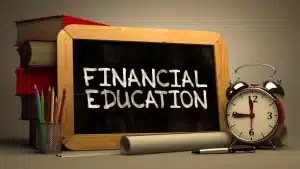Financial education for youth in South Africa is an essential topic that deserves more attention. It is crucial to prepare the next generation for financial independence and success in life.
As the global economy evolves, young people need to be equipped with the right knowledge and skills to make informed financial decisions. This blog post explores the importance of fiscal literacy for young South Africans and provides insights into how we can empower our youth for a financially secure future.
The Importance of Financial Literacy

Financial literacy is the foundation for making sound financial decisions. For the youth in South Africa, understanding how to manage money, save, invest, and handle credit is imperative. Without this knowledge, young people are more likely to fall into debt, struggle with savings, and face economic hardships in their adulthood.
However, when equipped with the right financial education, youth can start making smart choices early on. They can learn to budget effectively, understand the value of savings, and appreciate the benefits of investing for their future. This head start can set them on a path to financial stability and independence.
The benefits of financial literacy also extend beyond individual prosperity. A financially literate youth population can contribute to a more robust and stable economy. When young people understand financial concepts, they are less likely to be reliant on social services and more likely to contribute positively to the economy.
The Current State of Financial Education in South Africa
Despite the apparent need for financial education, the current state of fiscal literacy among South African youth is concerning. Many young people lack basic financial knowledge and skills. This gap can be attributed to several factors, including insufficient education within the school curriculum and a lack of resources and support for teachers.
While there are programs and initiatives aimed at improving financial literacy, they often do not reach all students, particularly those in under-resourced areas. This discrepancy leaves many young people at a disadvantage, unprepared to face financial challenges.
To address this issue, it is vital to integrate comprehensive financial education into the school system. By making financial literacy a compulsory part of the curriculum, all students will have the opportunity to learn essential financial skills, regardless of their background.
The Role of Parents and Guardians
Parents and guardians play a significant role in shaping their children’s financial habits and attitudes. From an early age, children observe and learn from their parents’ financial behaviors. Hence, it is crucial for parents to model good financial practices and actively teach their children about money management.
Simple activities like budgeting for groceries together, discussing the importance of saving, and involving children in financial decisions can make a significant difference. Open communication about money, including discussing financial mistakes and successes, can also provide valuable learning experiences.
Parents may not always have all the answers, but there are plenty of resources available to help. Workshops, online courses, and financial planning tools are accessible and can guide families in their journey towards financial literacy. By taking an active role, parents and guardians can help prepare their children for a secure financial future.
Tools and Resources for Teaching Financial Literacy
There is a growing array of tools to teach financial literacy to young people, including interactive apps, online courses, games, and workshops. These resources make learning about finances more engaging and effective for South African youth.
Mobile apps that simulate real-life financial scenarios help young people understand the consequences of their financial decisions. Online courses provide in-depth knowledge on topics from budgeting to investing.
Schools and community organizations can offer workshops and seminars to complement classroom learning. Collaborating with financial experts provides practical insights and advice. Using a combination of these resources can create a comprehensive financial education program, equipping youth with essential financial skills.
The Role of Technology
Technology is crucial in modern financial education. Digital tools make teaching financial literacy more accessible and interactive. Apps, online simulators, and educational platforms provide hands-on learning experiences for young learners.
These technologies can fill gaps where traditional methods fall short. Financial education apps often include gamified elements, making money management fun and relatable. Such interactive approaches keep students engaged and encourage continuous learning.
Moreover, technology allows for personalized learning experiences. Students can learn at their own pace and revisit complex topics as needed. As technology evolves, it will play an increasingly vital role in equipping young South Africans with essential financial skills.
Conclusion: Preparing for a Financially Secure Future
Preparing the next generation for financial independence is a collective responsibility. Educators, parents, and community leaders must ensure young South Africans receive the financial education they need.
Financial literacy involves managing money, planning for a secure future, understanding economic forces, and making informed decisions. By empowering youth with this knowledge, we help them achieve financial stability and positively impact the economy.
A financially educated youth will be better equipped to handle future challenges and opportunities. Let’s commit to strengthening financial education for South African youth and prepare them for a prosperous future.



